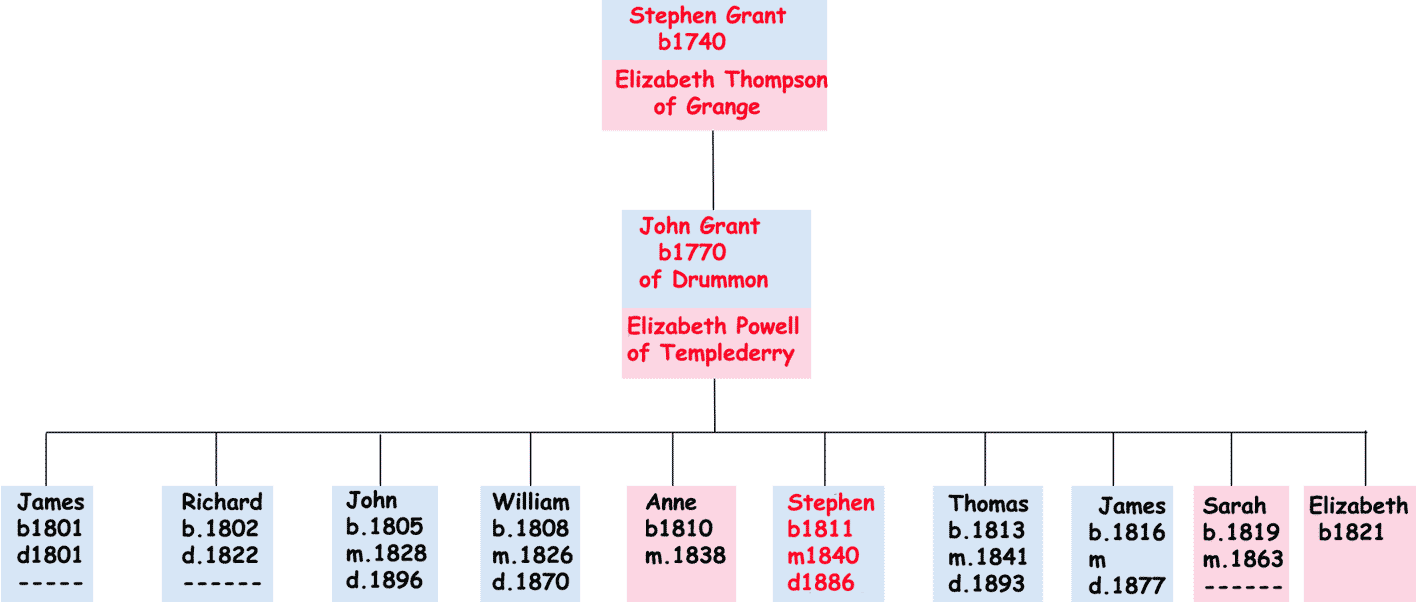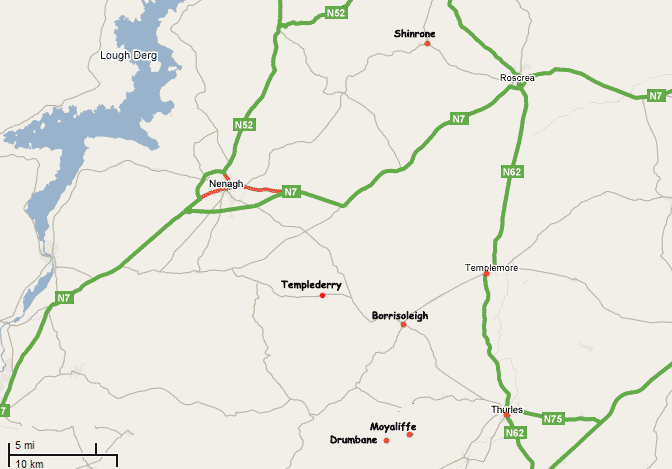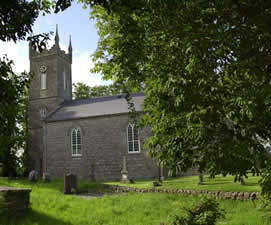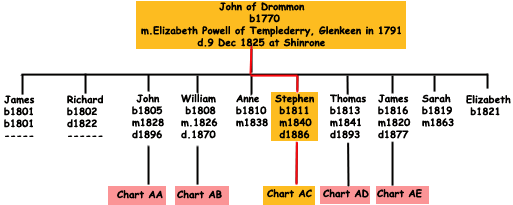

John was born in 1770, the son of Stephen Grant and Elizabeth Thompson, small Protestant farmers. John would have been born at Drumbane, Moyaliffe ( note, Moyaliffe Church of Ireland church was not built until 1790), and lived with his parents there until he married at the age of 21 to Elizabeth Powell of Templederry, Glenkeen by licence in 1791.
From the size of the families one can see the dramatic growth in Irish population taking place. The population of Ireland increased from about 3.5 million when he was born to about 7 million when he died. A doubling of the population in one lifetime. Rural unrest was endemic.

In the 1780,s there was a Rightboy gang in Borrisoleigh led by Samuel Middleton, a man with property and distilling interests. Rightboy oaths were sworn to ensure secrecy. Often whole villages were made to swear the oath, and swear to only pay a certain amount in tithes. The local clergyman was powerless, he could not evict, as any new tenant would face Rightboy violence.
Throughout his youth there were the Troubles, with the Whiteboy movement The anti militia riots in 1793 when 200 people died was a turning point in the agrarian unrest, the establishment were more prepared to turn guns on the crowds, and the Whiteboys were more prepared to risk pitched battles with the authorities. Conscription into the Militia was by lot, with maybe 5 or 6 from each parish.
Some of the anti Catholic laws were repealed in 1793, but political opposition grew, culminating with the French invasion of Ireland in 1798. Tipperary was not effected by this rising, but the rural unrest grew regardless. Flogging was the usual form of torture used by the authorities. The zealous High Sheriff of Tipperary, Fitzgerald, had broken the United Irish movement in the county. A report by General Sir John Moore tells of " A man tied up and being flogged, the sides of the street being filled with country people on their knees and hats off .... The rule was to flog each person until he told the truth and gave the names of other rebels. These were then sent for and underwent similar operation. Undoubtedly several persons were thus punished who richly deserved it. The number flogged was considerable. It lasted all forenoon. That some were innocent is I fear equally certain"
The bad harvest and the failure of the potato crop in 1799 led to both labourers and tenants being displaced. New tenants were murdered, and intimidation used to regulate potato prices. Both 1799 and 1800 were difficult years in Tipperary, with near famine conditions, and an upsurge in rural violence.
Until 1800, the unrest in John Grant's youth was against tithes and rent. It then turned sectarian with political overtones. The early Whiteboy violence was against property and animals (farm stock), however from 1800 it was directed more against people. The English prime minister , Pitt the Younger tried to solve the perennial Irish problem by getting the Irish parliament to pass the Act of Union in 1800. Pitt believed that with Union he could better conciliate the Catholics and pacify Ireland. But even with unification Pitt was unable to get the Westminster parliament to pass a bill enabling Irish Catholic emancipation.
For example in May 1800, the Long family of Drumbane were sworn to sell as much of their potato crop as possible to the local people, and to only feed their pigs once with potatoes. There were many attacks on the houses of local gentry to get arms, giving the Whiteboys more arms, meaning in turn more violence. Two pitched battles were fought near Holy Cross in March 1798 at Dundrum and Toberadora.
Factional fighting continued around Dundrum/Golden with reports of Shanavest/Caravat fights in 1807. The Caravat Whiteboy group in the area called themselves the Blue Belt Boys at this time. The Keeper Mountains formed a natural barrier between the north of the county and the south. There were few roads across it at this time, and much of the area was bog in the mountains. The violence was less in the north of Tipperary where there were more Protestants. Shinrone parish had over 20% Protestants, one of the highest figures for Protestants in Tipperary.

Shinrone Church of Ireland
The end of the Napoleonic Wars in 1815 brought about a fall in grain prices It ruined many small farmers . The larger farmers started to convert to pasturage, and the demand for farm labourers peaked and fell after this. Emigration by Protestants to Canada started, the first group was Talbot's from Cloughjordan in 1818.
John was the second of the Grants to appear in Shinrone, around 1800. Given he married in 1791, it is likely that other children were born elsewhere. John paid tithe on 5 acres at Towra to Guy Atkinson in 1824. He died in Shinrone in 1825.
